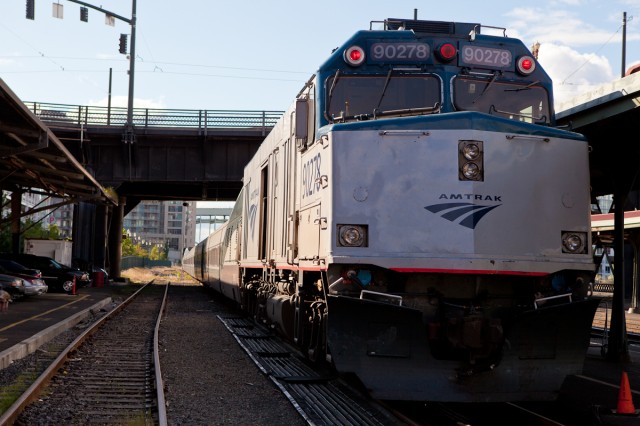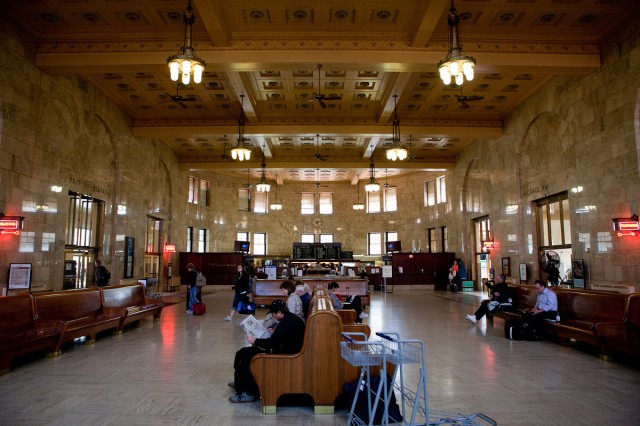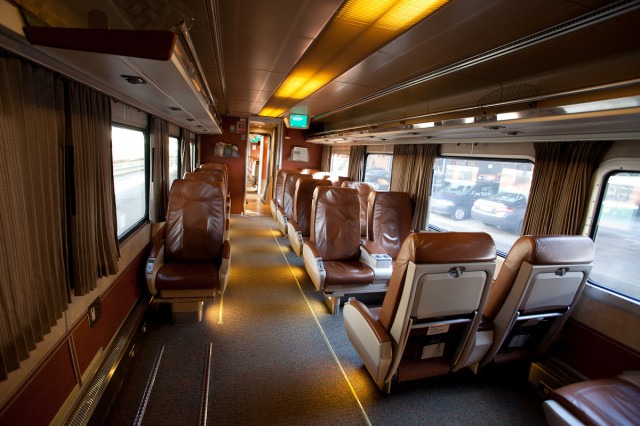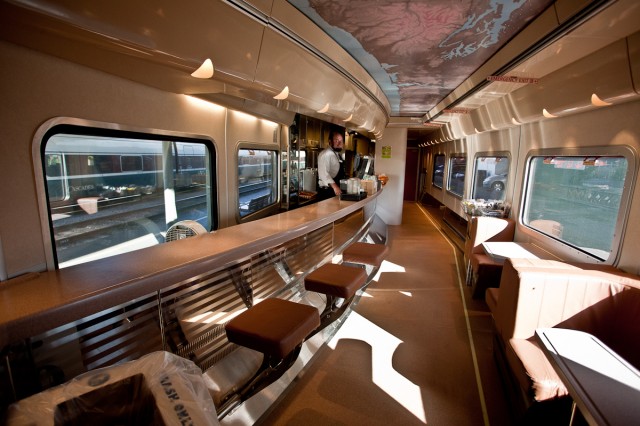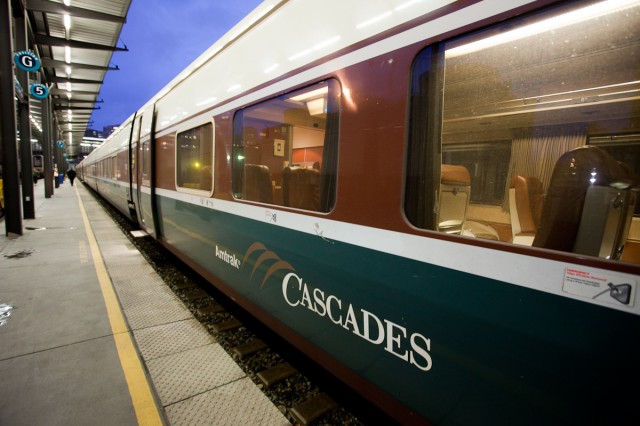Jeremy Dwyer-Lindgren, with NYCAviation.com, recently took an Amtrak train ride from Portland to Seattle and wrote a review to compare the experience to a flight. Here is his review in his own words:
AMTRAK REVIEW
Cheers: On-time, spacious, crazy low price
Jeers: Equal to driving time; three times as long as a flight
Coming off the recent experience with a Superliner car on a Vancouver BC to Seattle trip, we had to admit expectations were high. To refresh, coach class seating on the trip involved a crazy amount of legroom, generous recline, and almost a full window of view for an exceptionally low price. We had wondered at first when boarding in Vancouver if we accidentally boarded the business class car by mistake and were pleasantly surprised to discover we had not. If coach class was that impressive, we figured that business class had to be damn near palatial.
So you can imagine our surprise when taking advantage of priority boarding to car oneexclusively business classand discovering that the legroom we expected to be a sea of freedom ended up being about equal to the exit row on your average 737.
Curses.
But alas, we discovered we were set up. See, apparently the BC cars were an aberration. Normally the route utilizes the ones we were now looking atTalgo IV articulated tiltedbut we had a substitute from the usual cars the day we traveled from BC; the double-decked Superliner, which is normally only used on long-haul routes like Chicago to LA’s Southwest Chief. Because the Superliner is built for long-haul days-on-end trans-cons, coach class is built to enable someone to comfortably call that seat home for long periods of time. The Talgo car we were on, again the usual cars for this route, was built for high-speed. The train set can travel up to 110 but is limited to 79mph by safety restrictions.
Still though, first impressions can be deceiving and we settled into seat 7C in the 2-1 configured cabin. Fresh from an assignment that ended only an hour earlier, we set up right away to get to work while the train pulled away from Portland’s Union Station on time. The massive laptop came out right away. A meal tray easily unlatched and set itself a comfortable distance away, large enough to handle the behemoth computer. Between the wide seat width and sitting along the aisle we did not feel cramped: there was enough room to juggle our laptop, iPad, camera, and paperwork without too much trouble.
Work-space comfort? Check.
Thanks to needing to run some high-powered photo editing software, it desperately needed some juice. No worries though, as there is a plug right there by our feet along the floor.
Power? Check.
Finally, we very much needed to catch up on some email and otherwise utilize the world-wide web. While Amtrak’s free WiFi service is much maligned and apparently notorious for being awful, the service ran largely without issue the entire trip. A few hiccups through tunnels and again when trying to attach several large files were the only times that the service stopped or slowed at all.
Connectivity? Check.
The combination of spatial comfort, constant power, and consistent connectivity made getting work done on board a real breeze.
Halfway through the trip, somewhere around Centralia WA, we took the opportunity to visit the dining car and grab some grub. We ordered a cheeseburger ($6) with a bottle of orange juice ($2.50). The burger, which was heated via microwave, was pretty good. It was not the same as ordering from a decent restaurant or cooking on your grill at home, but it was fairly large and filling. The orange juice was, well, orange juice: pretty self-explanatory. Thanks to a $3 coupon given to the folks with a biz class ticket, the final bill came out to $5.50: not bad and cheaper than most airline meals.
The dining car itself is pretty nice, reflecting that these particular train sets are relatively new by Amtrak standards. They were introduced to the stock in the mid 90s and serve exclusively on the Cascades route. The ceiling bears tiny lights that we imagine were stars and featured a map of the route. The overall aesthetic was inviting, featuring a flowing bar-style counter and a number of booths. While we were there, the car was mostly empty. There was another passenger nursing a beer and a conductor taking a break.
Getting back to our seat, we finally had time to enjoy the experience more fully. With the comfortable leather seat fully reclined (estimated 8 inches or so), we caught a brief cat nap before spending the rest of the trip soaking in the seriously stunning scenery whizzing by out the window. Our train, scheduled to arrive at Seattle’s King St Station at 2145, pulled in early at 2130.
The trip was very enjoyable overall: food was reasonable and priced well, the seat was relaxing and comfortable, space sufficient to accommodate work and relaxation; all while arriving ahead of schedule. That being said, we are unsure if upgrading to business class was entirely worthwhile. We had intended to compare and contrast against our BC-Seattle trip, but given how different they were that no longer seems fair.
What we can say is that coach class is configured in a still generous 2-2 layout, with some sections having family style seating. WiFi and power outlets are standard. The recline was still more than your average airline coach recline, and legroom not that much less than in business. Coach was pretty full and fairly loud while business was about 50% full and very quiet. Given that the upgrade cost a measly $16 ($13 after applying a $3 AAA discount), resulting in a $42 total ticket price, the upgrade definitely seemed like a better deal.
And of course you receive many of the other benefits of train travel: no crazy invasive TSA security, no hours stuck behind the wheel waiting for a car wreck to clear, more space and comfort, and the ability to sit back, relax and let the world pass you by.
[nggallery id=5]
